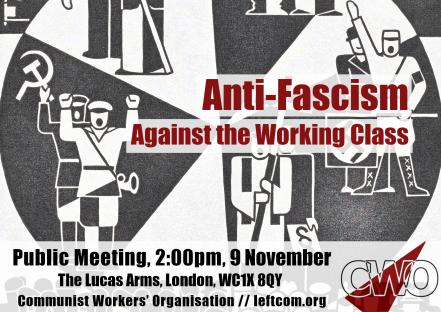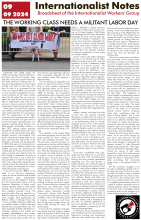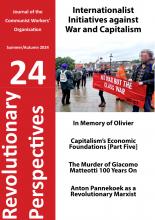September 2024
Capitalism and its Environment
I had thought the CWO was going to be having a meeting on the environmental issues in Glasgow in November but apparently not. Anyway i wanted to contribute to a discussion of these issues and wrote some thoughts using what i thought was a good article, 'Climate-Production-Capital', as a base.
blockquote { margin-left: 1cm; margin-right: 1cm; background: transparent }p { margin-bottom: 0.25cm; line-height: 115%; background: transparent }a:visited { color: #800000; so-language: zxx; text-decoration: underline }a:link { color: #000080; so-language: zxx; text-decoration: under ... it is therefore a question of combining the denunciation of the effects of global warming with the battle against capitalism as a whole. In order to pursue this ambitious project, internationalists undertake to produce and circulate a critique of capitalism on the three levels of the environment, imperialism, and the economy. The climate question, as we have seen, is also a product of the relationship between classes: between a predatory bourgeoisie that strips the planet of all its resources, and a proletariat that must find within itself, starting from its most advanced part, the ability to combine the fight against exploitation, war and climate change and environmental devastation with the strategic elements of a revolutionary project. 1
This article by Battaglia Communista provides interesting data around the sixth IPCC report on climate change and poses some questions for further discussion of the importance of the environment in the decline of the capitalist system and the role of the working class in response to this process.
‘Anyone who thinks that you can have infinite growth in a finite environment is either a madman or an economist’2 is the basis of a slogan that has been increasingly used by the environmental lobby yet it is not something we should ignore or reject easily. Environmentalist have so far tended to believe and pose the issue as one of changing capitalism, of making decisions that would benefit nature, of reforming it. This is pure idealism.Evidence shows that it is not generic "human activity" that causes current climate change, but the specific form that this activity has taken in the last quarter of a millennium: i.e. the capitalist mode of production.3
Capitalism can change elements of the way it works certainly eg the banning of CFCs in the 1990s has had an impact on global warming but it hasn’t stopped the process nor has it prevented the emergence of new industries or situations that are stimulating further global warming. In reality the way capitalism comes up with solutions to crises is by further growth which is no solution at all, it just exacerbates the overall problems.
The falling rate of profit itself does not just generate crises, it is also the basis of the continual growth of capitalist society. This is because the FROP means the continual growth in constant capital and hence in production or productive capacity. In fact even a small percentage in GDP4 growth per year for example 3% growth per year (which not so far from the average since the 1960s) means that GDP doubles in just over 23 years. This is confirmed by the World Bank’s data:
This constant growth of accumulation also means a constant growth in population and both of these have been particularly evident in the data from the 1950s onwards. In this context, it is clearly not just an economic collapses etc that are the cause of problems for capitalism, it is the very growth of the system itself. What is happening today is not just damage to the environment caused by capitalist society and production, it is an absolute threat to the environment we depend on, and this is a product of the whole relationship between capitalism and nature.
This is significant because whilst human beings depend on production to provide their means of subsistence, we should also recognise that production depends on nature, ie on the physical world itself. It is nature that provides the mineral and chemical resources, supports agriculture and meat produce and animal diversity.
The increased scale of production and growth of population must have has a major impact on nature and that is what we are seeing significantly today in the growth of dangerous emissions, climate change, over-use of sea and land resources, reduction in diversity, plagues and famines, and ultimately civil conflict. The very search for efficiently creates not just larger industries but also the need for larger development of mineral resources, larger means of transport and distribution, something which causes ever greater problems for the environment esp when things go wrong,This idea of a conflict between the growth of production and the environment can be seen in this quote from International Perspectives who also suggest that capitalism must now be seen as a catastrophic threat to the environment.The reality of irreversible (human-caused) climate change that we now know faces humankind with catastrophic consequences results from the same underlying cause that also leads to natural resource depletion. It is the same drive to separately, competitively exploit all of nature to the maximum in order to maximize capital valorization. In this process, every capital unit extracts or appropriates from nature the most that it can. Human-generated climate change actually results from the accumulated output, in atmospheric emissions of carbon-based (‘greenhouse’) gases as a byproduct of capitalist industrial production and transportation. It results from a relentless pursuit of profit, blind-folded to the reality of its ‘collateral damage’ to ecosystems and the atmosphere of the earth. This damage is in fact capitalism’s unabashed abuse of its natural environment by means of its (members’, agents’) operation of its own specific means of production, transportation and destruction. Capitalist science remains largely blind to this damage, as long as it serves profit-maximization and power consolidation.5
I think this puts a different perspective onto the growth of capitalism. We tend to try to see economic crisis within capitalism as caused by the ‘fetters on the productive forces’ as explained by Marx and as a consequence it is all to easy to believe that communism represents freedom for new growth in the productive forces. However the term fetter can be interpreted in different ways. Let us look at IP again:… the conclusion is invariably drawn by all such Marxists that capitalist decadence consists in the productive forces being fettered (constrained, blocked, slowed, etc.) by the capitalist relations of production. To question Marx on this matter would appear to be unthinkable ... as long as one considers oneself to be a Marxist. It is to question Marx on this matter that I wish to do here... while still considering myself to be Marxist. First off, though, I need to make clear that I see two (very different) possible interpretations of what Marx meant by"the development of the productive forces" in the passage just quoted. The 'standard' interpretation, made by all of the revolutionaries and groups referred to above, is what I call the productivist version. It understands by"development of the productive forces" only quantitative increase in productive capacity. "Development" is understood as genesis or bringing into existence only. Productivity, as an empirically verifiable quality of the productive forces is the key. The other interpretation understands by "development of the productive forces"their actual implementation, utilization, or application, as opposed to their genesis. In this sense, their development is fettered if their full utilization or implementation in practice is blocked. New productive forces may have been brought into being (by the decadent society), but they haven't been really developed in the sense of being fully utilized to the benefit of society. 6Communism is the production of use value not exchange value which can means a restructuring of production forces towards the needs of humanity not profit. What we will expect to see is therefore an overall reduction in levels of production The last questions posed in the Battaglia Communista article is how the working class can respond to the threat to the environment. I cannot see this issue impacting on our vision of class struggle other than, as that struggle becomes political, it must challenge all the iniquities of capitalist society. It does however have specific consequences for how the working class tackles building a new society.
2David Attenborough, Speech given to Royal Geographical Society October 2013
3ibid
4In investigating growth on industry and society as a whole and not just capital growth then GDP is a perfectly adequate figure to use
5ER 2009 Capitalism, Technology and the Environment in IP50
6ER 2009 For a Non-productivist Understanding of Capitalist Decadence IP50 p.sdfootnote { margin-left: 0.6cm; text-indent: -0.6cm; margin-bottom: 0cm; font-size: 10pt; line-height: 100%; background: transparent }blockquote { margin-left: 1cm; margin-right: 1cm; background: transparent }p { margin-bottom: 0.25cm; line-height: 115%; background: transparent }a:visited { color: #800000; so-language: zxx; text-decoration: underline }a:link { color: #000080; so-language: zxx; text-decoration: underline }a.sdfootnoteanc { font-size: 57% }
Start here...
- Navigating the Basics
- Platform
- For Communism
- Introduction to Our History
- CWO Social Media
- IWG Social Media
- Klasbatalo Social Media
- Italian Communist Left
- Russian Communist Left
The Internationalist Communist Tendency consists of (unsurprisingly!) not-for-profit organisations. We have no so-called “professional revolutionaries”, nor paid officials. Our sole funding comes from the subscriptions and donations of members and supporters. Anyone wishing to donate can now do so safely using the Paypal buttons below.
ICT publications are not copyrighted and we only ask that those who reproduce them acknowledge the original source (author and website leftcom.org). Purchasing any of the publications listed (see catalogue) can be done in two ways:
- By emailing us at uk@leftcom.org, us@leftcom.org or ca@leftcom.org and asking for our banking details
- By donating the cost of the publications required via Paypal using the “Donate” buttons
- By cheque made out to "Prometheus Publications" and sending it to the following address: CWO, BM CWO, London, WC1N 3XX
The CWO also offers subscriptions to Revolutionary Perspectives (3 issues) and Aurora (at least 4 issues):
- UK £15 (€18)
- Europe £20 (€24)
- World £25 (€30, $30)
Take out a supporter’s sub by adding £10 (€12) to each sum. This will give you priority mailings of Aurora and other free pamphlets as they are produced.
ICT sections
Adverts
Glasgow Bookfair
RED AND BLACK CLYDESIDE BOOKFAIR
The CWO will have a stall at the Red and Black Clydeside Bookfair, there will also be an NBWCW meeting.
When: Saturday, 7 December 2024
Where: TBA
London Public Meeting
ANTI-FASCISM AGAINST THE WORKING CLASS
PUBLIC MEETING AND DISCUSSION
On 30 July riots broke out across the UK which targeted Muslim neighbourhoods and places sheltering migrants, following a stabbing in Southport the day before. The riots were fuelled by fascist groups and far right websites spreading the conspiracy theory that the attacker was a Muslim asylum seeker.
Decades of racist propaganda from mainstream news sources, which blame immigrants for workers’ decline in their standard of living, have led to many thinking that immigration into Britain is the cause of reduced wages, homelessness, a collapsing health service, failing schools etc. rather than increased exploitation of the working class and capitalism’s economic crisis.
The response to this from capitalism’s political left has been to organise against fascism, with national demonstrations of the ‘great and good’ against the riots and against racism in defence of democratic freedoms. But fascism and democracy are simply strategies of the capitalist class to continue exploiting us. Strategies they use to recruit us to fight their wars. Organising specifically against fascism, amounts to supporting one section of the capitalist class against another. It is still in favour of the capitalist system. What we need is to oppose the entire capitalist system through the broader class struggle, leading to the eventual overthrow of capitalism itself.
While other approaches to anti-fascism involve small groups, engaged in physical confrontations with fascists, it is an approach that similarly offers no solutions to a system that breeds racism.
We argue that only the end of capitalism can put an end to poverty, misery and racism and only the working class can achieve this.
Come join us in a public meeting to discuss this.
When: Saturday, 9 November 2024, at 2:00pm
Where: The Lucas Arms, 245A Grays Inn Rd, London, WC1X 8QY (nearest tube: King's Cross)
Communist Workers' Organisation
IWG Meetings
IWG MEETINGS
The IWG will be holding regular in-person meetings where sympathizers are encouraged to come and get in contact.
New York: Last Saturdays of the month 3:30pm at Peculier Pub (145 Beecker St)
Philadelphia: Last Saturdays of the month 11am at B2 cafe (1500 E Passyunk Ave)
Lambertville, New Jersey: Tuesdays 8/13, 8/20, and 8/27 at 7 PM in the Lambertville Library (6 Lilly Street, Lambertville, NJ), for discussions on the Russian Revolution and Counter-Revolution.
Columbus: Last Sunday of every month, from 8PM-10PM, at Kafe Kerouac (2250 N High St, Columbus, OH).
Los Angeles: Please contact to get in touch.
Means of contact:
Email: us@leftcom.org
Instagram: @iwg.official
Facebook: @iwgusa
Twitter: @IWGOfficial
Recent publications
August 2024
Aurora is the broadsheet of the ICT for the interventions amongst the working class. It is published and distributed in several countries and languages. So far it has been distributed in UK, France, Italy, Canada, USA, Colombia.
Out now!
Journal of the Communist Workers’ Organisation -- Why not subscribe to get the articles whilst they are still current and help the struggle for a society free from exploitation, war and misery? Joint subscriptions to Revolutionary Perspectives (3 issues) and Aurora (our agitational bulletin - 4 issues) are £15 in the UK, €24 in Europe and $30 in the rest of the World.
Written by Jock Dominie. £12, 276pp.
The Russian Revolution remains a landmark event in history. For the bourgeois historians, the October Revolution is thought to be a tragedy that set back the achievements of the “democratic” February Revolution, and allowed the Bolsheviks to wreak havoc on their citizens and the world. For the Stalinists, the events of 1917 paved the way for the birth of the USSR, which they point to as a prototypical example of “socialism in one country”. In reality, the February and October Revolutions were both part of the same proletarian revolution.
The book can be ordered by emailing us at uk@leftcom.org and asking for our banking details, or by donating the cost of the publications required via Paypal using the “Donate” button. Postage charges should be added. If in the UK, and paying direct to our bank account, first class postage is free. If via Paypal add £2. For Europe cost of a copy with postage is €20 (EUR), for Australia it is $42 (AUD) and for the USA and anywhere else in the world it is $27 (USD).
User login

This work is licensed under a Creative Commons Attribution 3.0 Unported License.









Link
Link
Thanks for that. Yes we did plan to have a meeting in Glasgow on 6 November and our North comrades even found a room but studying the logistics of the days activities made us realise that it would be very difficult to fit in to what will be a long day. We will have a contingent with banner on the demo and a book stall plus the new Aurora (out on Friday) which is dedicated to the discussion you have initiated here. There is actually a critique of the productionist ideology which emerged from both Social Democracy and the Russian Revolution (in the shape of the Stalinist counter-revolution but there were elements of continuity) in the last couple of chapters of the Russian Revolution book. Social Democracy interpreted "the forces of production" as just constant capital, factories and raw materials whereas the completion of this also includes the working class (which will only really flourish when capitalism has been overcome - but then it will not be a separate class - it will have melted such barriers into humanity (the Greens are premature in talking of humanity today and this is their weakness).
Nothing much to disagree with in the above - its all about getting the ideas across now and your last point that climate change whilst urgent is not the only threat that the continued existence to life posed by capitalism is absolutely right.